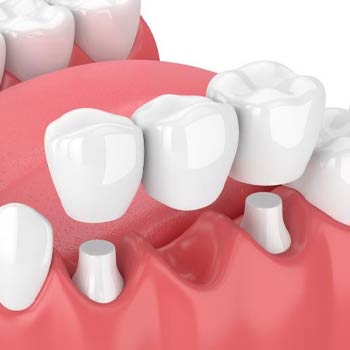When it comes to restoring damaged or missing teeth, dental crowns, and bridges play a pivotal role in modern dentistry. In this comprehensive guide, we will delve into the intricacies of crowns and bridges, exploring what they are, how they differ, the various types available, and the numerous benefits they offer.
What is a Crown?
A dental crown, often referred to as a cap, is a prosthetic covering that encases a damaged or decayed tooth. This restoration not only strengthens the tooth but also improves its appearance and functionality. Crowns are custom-made to match the color, size, and shape of the natural teeth, ensuring a seamless integration into the patient's smile.
What is a Bridge?
Dental bridges are prosthetic devices designed to fill the gaps left by missing teeth. Comprising one or more artificial teeth, a bridge utilizes adjacent healthy teeth or dental implants as anchors. This not only restores the aesthetics of a complete smile but also prevents the surrounding teeth from shifting, maintaining proper dental alignment.

How is a Crown & Bridge Different?
While both crowns and bridges serve as dental restorations, they differ in their primary functions and applications. Crowns are primarily used to protect and strengthen individual damaged teeth, while bridges are employed to replace missing teeth by anchoring artificial teeth between existing ones. Understanding this fundamental difference is crucial for determining the most suitable treatment plan for individual dental needs.
Different Types of Crowns
- Porcelain Crowns: Mimicking the appearance of natural teeth, porcelain crowns are popular for their aesthetic appeal. They are an excellent choice for front teeth restoration.
- Metal Crowns: Known for their durability, metal crowns, such as those made of gold or silver alloy, are ideal for back teeth where strength is paramount.
- Porcelain-fused-to-Metal (PFM) Crowns: Combining the strength of metal with the aesthetics of porcelain, PFM crowns strike a balance between durability and natural appearance.
- All-Ceramic Crowns: These crowns are entirely crafted from ceramic materials, providing a natural look and suitable for individuals with metal allergies.
Different Types of Bridges
- Traditional Bridges: The most common type, traditional bridges consist of artificial teeth supported by dental crowns placed on adjacent natural teeth.
- Cantilever Bridges: Suitable for situations where only one adjacent tooth is available for support, cantilever bridges are anchored on one side.
- Maryland Bridges: Utilizing a metal or porcelain framework, Maryland bridges are bonded to the backs of adjacent teeth, eliminating the need for crowns.
- Implant-supported Bridges: Secured by dental implants rather than natural teeth, these bridges offer increased stability and prevent bone loss in the jaw.
Benefits of Crowns and Bridges
- Restoration of Functionality: Crowns and bridges enable normal chewing and speaking by restoring the structural integrity of damaged or missing teeth.
- Enhanced Aesthetics: These dental restorations improve the appearance of the smile, boosting confidence and self-esteem.
- Prevention of Further Damage: Crowns protect weakened teeth from additional damage, while bridges prevent adjacent teeth from shifting and causing misalignment.
- Long-lasting Solutions: With proper care, crowns and bridges can last for many years, providing a durable and reliable dental solution.
understanding the intricacies of dental crowns and bridges is crucial for making informed decisions about oral health. Whether it's strengthening a damaged tooth with a crown or filling the gaps left by missing teeth with a bridge, these restorations play a vital role in maintaining a healthy and aesthetically pleasing smile. If you're considering these dental procedures, consult the best dentist in vijayawada to determine the most suitable option for your individual needs.
frequently asked questions
Take the first step towards optimal oral care, consult the best dentist now
